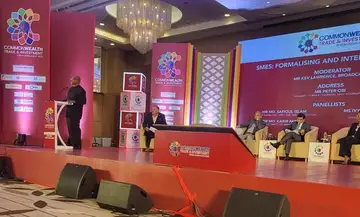Yesterday, I once again laboured to watch the presentation of the former Governor of my dear state, Anambra in Bangladesh at a Commonwealth Trade and Investment Forum during a panel discussion on formalising and internationalising SMEs. Mr. Peter Obi in his usual manner of reeling out both necessary and unnecessary figures and statistics to impress his audience found himself struggling to remain coherent.
From the look on the faces of the audience and panelists during Mr. Peter Obi’s presentation, one could see a feeling of ‘what’s this man saying exactly!’ written all over them especially when he struggled to correctly quote the global GDP per capita. Mr. Peter Obi was spending more time quoting statistics rather than actually discussing HOW to formalise and internationalise SMEs, which was the theme of the panel discussion.
To many back in Nigeria, this is not surprising because Obi is known for making generic statements with no clear or specific solutions whenever he is asked the question HOW. He is very good at emphasising on the problem and using comparative statistics he gleaned from the internet to show how bad the problem is when compared to others. However when it comes to proffering specific practical solutions to these identified problems, he usually drifts away and ends up most times not making any sense.
Today however, I want to go into the substance of Mr. Peter Obi’s presentation on SMEs vis a vis his stewardship as Anambra State Governor for 8 years. After all, talk they say is cheap. As an Anambrarian who witnessed Obi’s 8 years in office at close quarters I find it amusing that Obi is discussing formalisation of SMEs or supporting them to grow.
Anambra, which Mr. Peter Obi led for 8 years is a state of entrepreneurs with the vast majority operating small and medium scale businesses. Obi as Governor cannot point to any meaningful policy he implemented that sought to formalise SMEs in Anambra State and improve their capacity to access credit facilities. Instead, Obi’s revenue agents (mostly thugs) harassed the hell out of these small businesses with multiple demands for levies and taxes – most of which eventually found their way into the pockets of the revenue agents he appointed.
It was commonplace to see Chairmen of markets for example, living like Kings and emperors courtesy of the levies milked from SMEs with many making secret cash returns to government officials while barely 10% makes it to the state coffers. Despite the increased taxation of SMEs by the Obi administration, official IGR figures did not grow significantly over a span of 8 years. This is the Peter Obi that was in Bangladesh trying to point at taxation and hostile regulatory environment as an impediment to SMEs growth.
Obi stated in his presentation that lenders prefer to lend to big businesses and that countries needs to set aside a percentage of credit for SMEs and went ahead to quote the percentage in some countries like China and Indonesia. But this is the same Peter Obi that instead of investing in small scale business or manufacturing enterprises that will create more jobs, ploughed $20 million of Anambra State money into a greenfield beer factory, Intafact Brewery in 2012, which he had personal business share in.
Peter Obi as a matter of fact has stated that he saved money in the banks on behalf of Anambra State. One begins to wonder if there were no SMEs in Anambra to support with loans at the same interest rate as the one the banks he saved the funds in would add interests to the funds saved in their bank. In essence, Obi saved money in bank(s) he could have used to lend to SMEs and grow them. The bank(s) in turn used part of the funds Obi saved in their bank to lend to big businesses. 11 years later, Obi is lamenting about such practice in Bangladesh.
Obi also said that SMEs because of their size are most times unable to export to international markets. That’s classic Obi theorising. Obi was meant to proffer ways to make SMEs export to international market (internationalise, which is part of the theme), but he simply restated the problem and jumped and passed. That’s simply because he does not have a concrete workable solution. As Anambra State Governor, he did not have one. Today, he still does not have one obviously.
In Anambra State, many opportunities abound for some SMEs that Obi could have provided funds (loans) to help them bridge the funding gap and the export/internationalisation difficulties he was talking about in Bangladesh. For example, instead of investing $20 million dollars in a beer factory that would have been built by Intafact without Anambra’s equity contributions in cash, Obi could have spread the $20 million worth around N3.16 billion as at that time to build at least 40 modern cassava starch processing plants across Anambra State.
I am not talking theory here but something practicable. Starch is a highly sought after export commodity. Cassava is very rich in starch. Nigeria is the world’s largest producer of cassava with the crop being the most widely cultivated crop in Anambra State. If Obi wanted to move from consumption to production while also helping SMEs to grow, he would have invested that N3.16 billion ($20 million) Hero beer factory equity into 40 agroprocessing SMEs that will produce starch for local and export markets.
As at 2012, with N70 million, one can purchase the full complement of a cassava starch processing line comprising of Cassava peeling and washing machine, grating machine, Cassava starch extracting machine, centrifugal and hydrocyclone machine, vacuum dewatering machine and starch dryer machine in addition to few pumps and stainless steel hopper. But Obi chose to invest that lump sum in a beer factory and today he is lamenting on behalf of SMEs in Bangladesh. I am tired!

